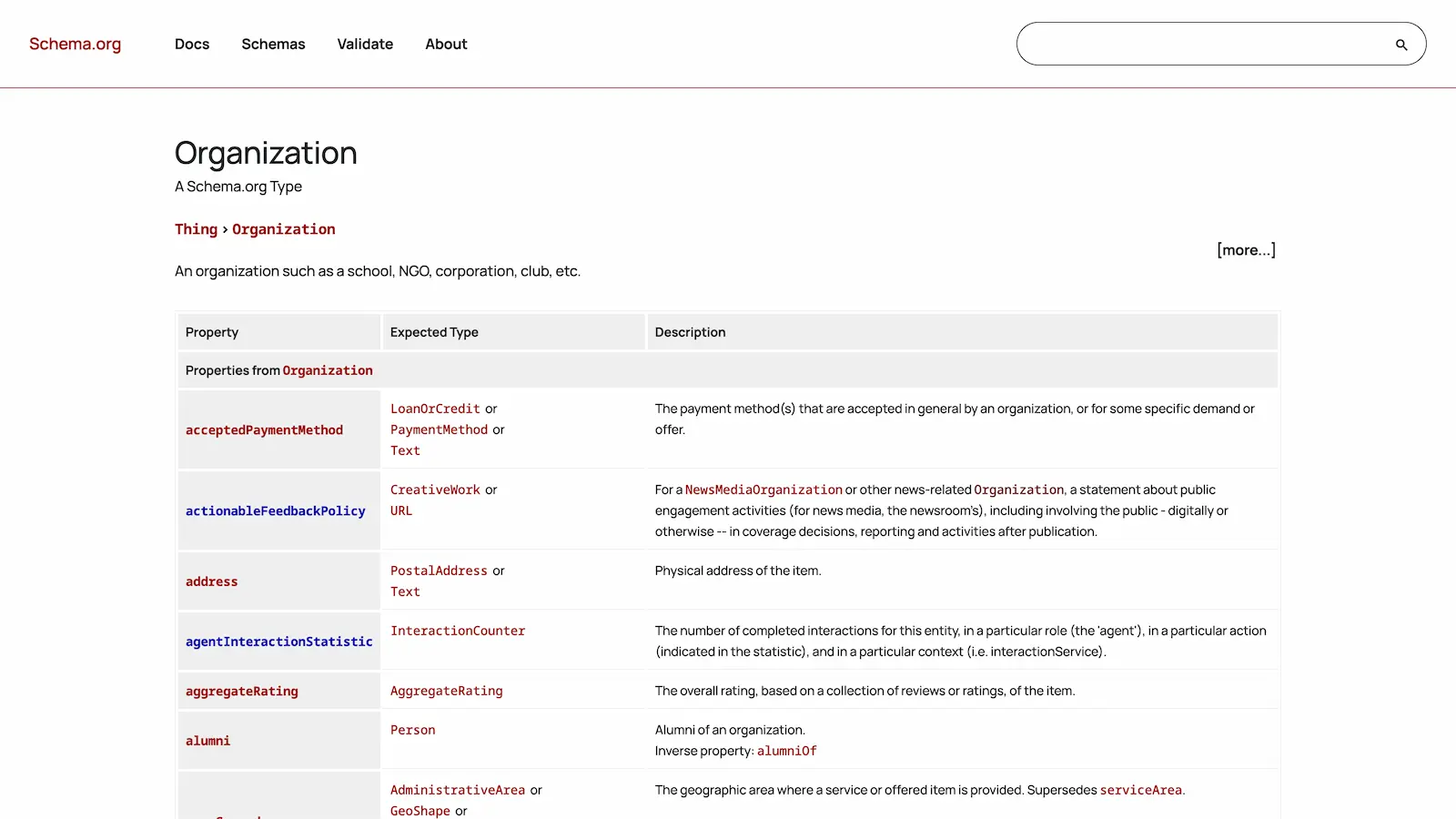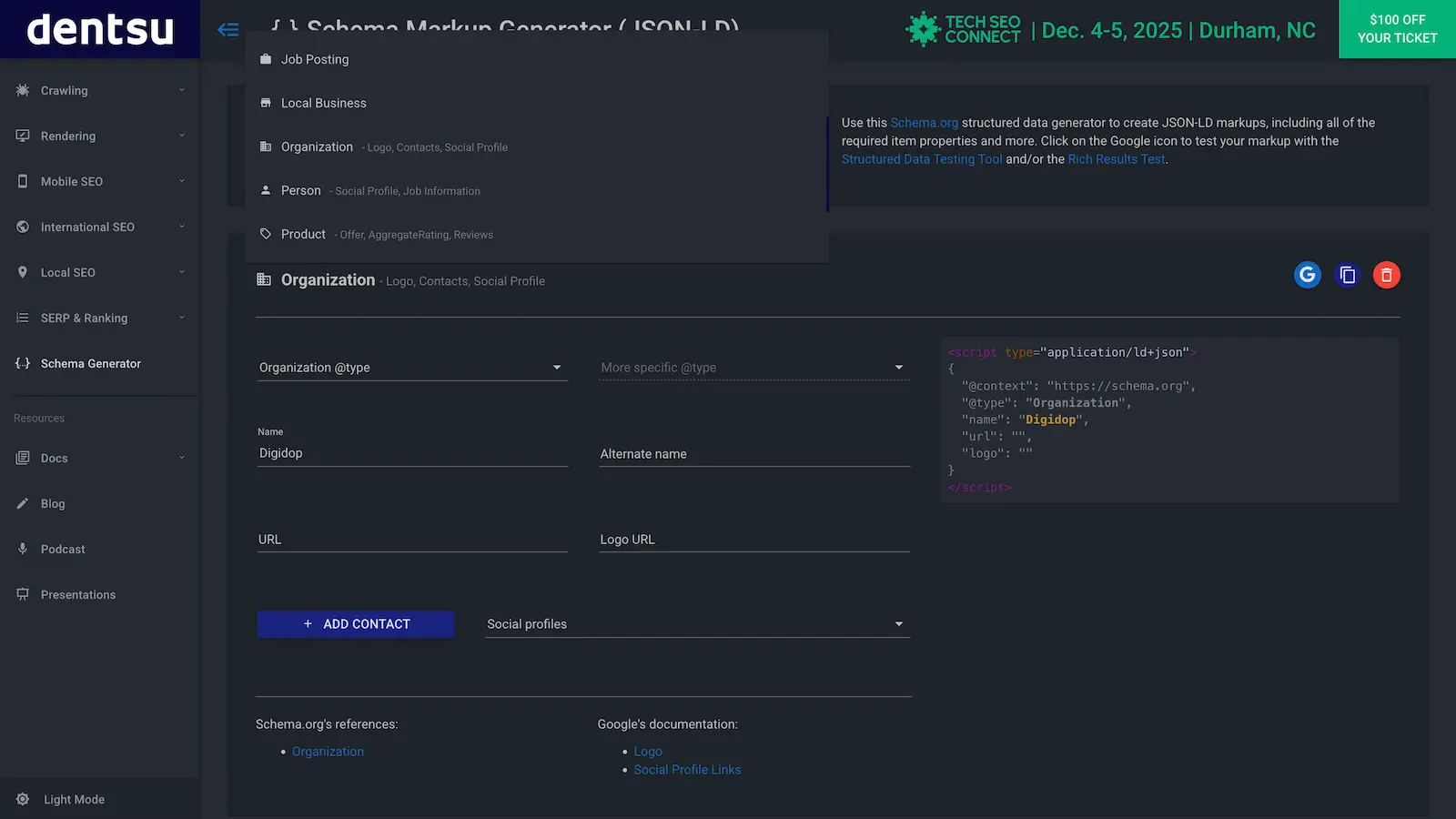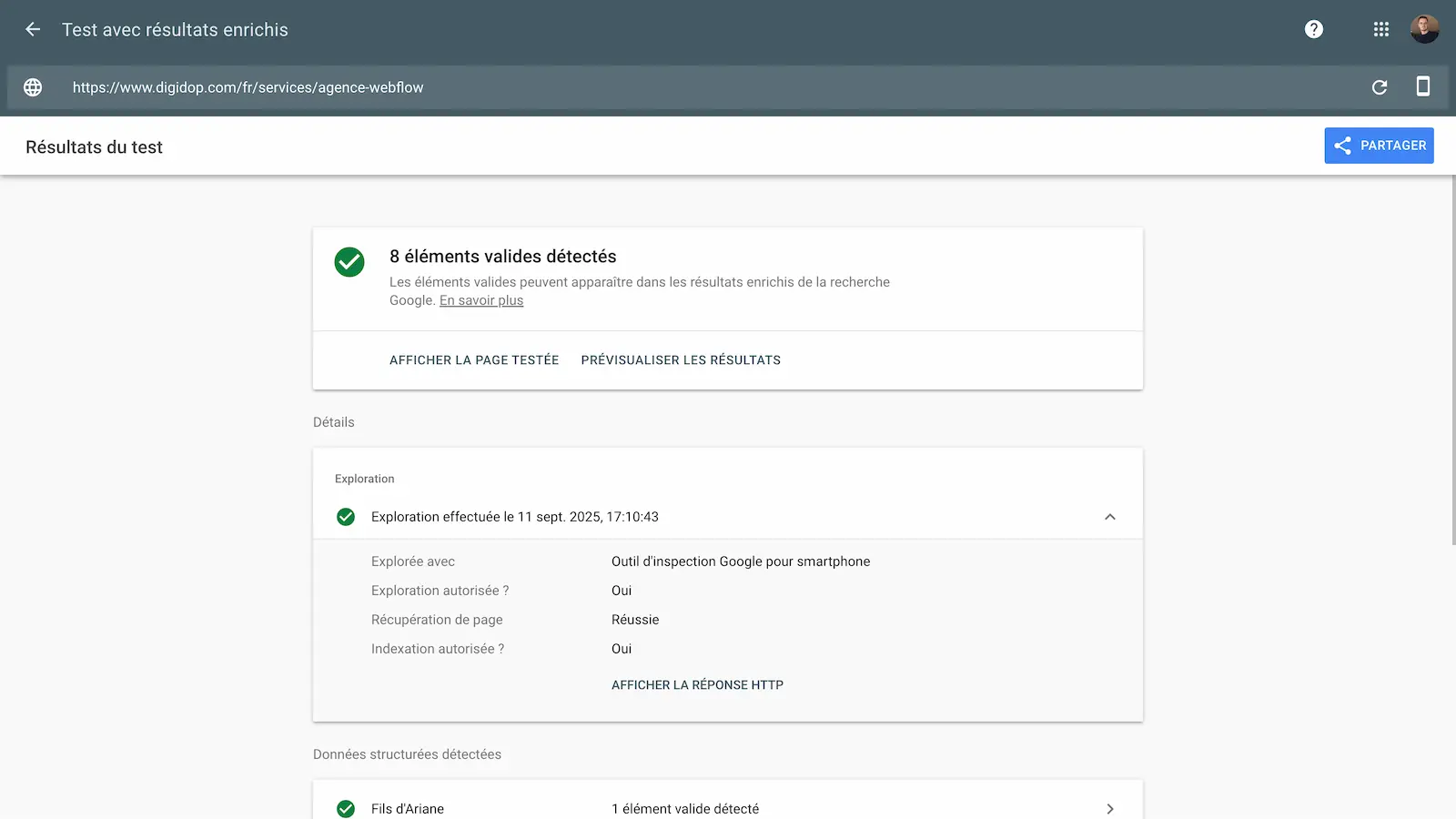Structured data or enriched data are information-filled data that help Google easily understand what it will find on your website. This data is in J-SON format, and there are various examples of use cases;
- Identifying a product (e-commerce site)
- Defining content such as a blog article
- Defining the business of your organization
- Highlighting customer reviews
Why should I inject structured data on my site?
You know my perspective. Google's algorithm is logical. Adding structured data to your site allows Google to quickly understand its content. And how does Google say thank you?
- Rich Snippet results
- Better SEO rankings
- Increased crawl budget
- Etc...
If you are committing to an SEO strategy with a touch of "technique," structured data or schema.org is a crucial markup to integrate.
How to learn to use structured data?
Theory and practice. You will find everything
2.1 Google, the best free resource
Presented with clear videos or documentation accompanied by examples, Google makes life easy for you! Dive into the documentation to easily grasp the theoretical part of enriched data.
2.2 Schema.org
The bible of enriched data (schema.org).
I find the content less educational than Google's official documentation, but you will find many use cases and applications for different types of data on this website.
Preview of a page from the schema.org site
2.3 Use an automatic generation tool
It's time for practice! You have two options;
- Create your data by writing your entire J-SON file
- Use a tool to simplify this writing (semi-automatic 🔫): link to Merkle Schema Generator
Bonus: test your structured data's functionality with this tool
It's normal to make mistakes during your first tests! Just remember... (even if Google claims that errors in enriched data are not penalized) to check your schema file before integrating it into your website!
Google offers a free analysis tool, take advantage of it!
Conclusion!
You now know what structured data is, also known as enriched data or schema.org. You also understand that they make it easier for Google's bots, and therefore have a positive impact on your website's SEO.
It is advisable to use a tool to assist you in drafting this data. Finally, it is important to test your file before integrating the data into your website!
A silent revolution is transforming SEO
Structured data represents much more than simple technical markup. In 2025, it constitutes the bridge between your content and artificial intelligences that are redefining the search experience. While most websites remain unreadable to algorithms, those who master rich data are taking a decisive lead.
This transformation is accelerating with the emergence of Generative Engine Optimization (GEO), a discipline that complements traditional SEO. Where SEO aims for clicks to your site, GEO optimizes your chances of being cited directly in responses generated by ChatGPT, Gemini, or Perplexity. Structured data then becomes the invisible infrastructure that allows AI to understand, extract, and recommend your content.
Understanding structured data in 2025
Structured data uses the Schema.org vocabulary, created in 2011 by Google, Microsoft, Yahoo, and Yandex. This standardized language organizes information according to precise categories that search engines can interpret instantly.
Concretely, these tags transform simple text into rich contextual information. A page mentioning "margherita pizza $12" becomes, thanks to Product markup, a complete product sheet with price, availability, and technical characteristics. Search engines immediately understand that it's a dish, its price, and description.
The main types of structured data include:
- Article: for editorial content and blogs
- FAQ: for structuring questions and answers
- LocalBusiness: for local businesses
- Product: for e-commerce product pages
- HowTo: for tutorials and practical guides
The revolutionary impact on SEO and GEO
Traditional SEO: an indirect but measurable influence
John Mueller from Google confirmed in 2025 that structured data doesn't directly influence rankings. However, their impact on user engagement is significant. Rich snippets generated by this data attract more attention in SERPs and increase click-through rates.
A BrightEdge study reveals that pages with structured data get 30% more clicks compared to standard results. This improvement in engagement sends positive signals to Google, creating a virtuous circle for SEO.
GEO: the competitive advantage for generative AI
The major evolution of 2025 concerns optimization for Large Language Models (LLMs). These artificial intelligences favor structured content to generate their responses. A Data World study demonstrates that GPT-4 goes from 16% to 54% correct responses when content relies on structured data.
Queries in AI are longer and conversational: 23 words on average versus 4 in Google. Users ask precise questions like "Which energy renovation expert to choose near Lyon for an old house?" Structured data allows AI to quickly extract relevant response elements.
The strategic role in the modern AI ecosystem
Facilitating information extraction by LLMs
Generative language models analyze billions of web pages to construct their responses. Structured data accelerates this process by providing a clear "reading map" of the content. Instead of analyzing unmarked text blocks, AI can directly identify key information.
A movie website using Movie markup with director, genre, and release date will allow ChatGPT to instantly generate a precise response about these films, citing the source. This extraction speed directly influences citation chances.
Integration with knowledge graphs
The most advanced AI systems rely on Knowledge Graphs rather than simple text generation. These structured databases connect entities, their properties, and their relationships. Schema.org data directly feeds these graphs, creating a network of verifiable knowledge.
This approach reduces AI "hallucinations" by relying on structured facts rather than statistical probabilities. Brands that invest in this structuring become authority sources in the AI ecosystem.
Concrete implementation examples with JSON-LD
Practical case 1: GEO-optimized blog article
For a blog article about SEO, here's the JSON-LD markup that maximizes chances of citation by AI:
<script type="application/ld+json">
{
"@context": "https://schema.org",
"@type": "Article",
"headline": "Structured data: SEO and GEO optimization for AI in 2025",
"description": "Complete guide on the impact of Schema.org structured data for traditional SEO and generative AI optimization",
"author": {
"@type": "Organization",
"name": "Digidop",
"url": "https://digidop.com"
},
"publisher": {
"@type": "Organization",
"name": "Digidop",
"logo": {
"@type": "ImageObject",
"url": "https://digidop.com/logo.png"
}
},
"datePublished": "2025-09-11",
"dateModified": "2025-09-11",
"mainEntityOfPage": {
"@type": "WebPage",
"@id": "https://digidop.com/blog/structured-data-seo"
},
"keywords": ["structured data", "SEO", "GEO", "AI", "Schema.org", "search optimization"],
"articleSection": "SEO",
"wordCount": 2500
}
</script>
Practical case 2: FAQ optimized for conversational queries
Structured FAQs are particularly effective for appearing in LLM responses as they match the natural question-answer format:
<script type="application/ld+json">
{
"@context": "https://schema.org",
"@type": "FAQPage",
"mainEntity": [
{
"@type": "Question",
"name": "Do structured data directly improve Google rankings?",
"acceptedAnswer": {
"@type": "Answer",
"text": "No, the impact is indirect. John Mueller from Google confirmed in 2025 that structured data doesn't directly influence rankings. However, they improve result display (rich snippets), increase click-through rates, and strengthen user engagement."
}
},
{
"@type": "Question",
"name": "Do AI like ChatGPT actually use structured data?",
"acceptedAnswer": {
"@type": "Answer",
"text": "Yes, but indirectly. LLMs analyze web content during training and real-time queries. Structured data facilitates this information extraction and improves the accuracy of generated responses."
}
}
]
}
</script>
Practical case 3: Local agency optimized for AI search
For a local web agency, this markup maximizes chances of appearing in AI geolocated searches:
<script type="application/ld+json">
{
"@context": "https://schema.org",
"@type": "LocalBusiness",
"@id": "https://digidop.com",
"name": "Digidop - Webflow Agency",
"description": "Agency specialized in Webflow website creation and SEO optimization. Expert in structured data and AI search optimization.",
"url": "https://digidop.com",
"telephone": "+1-555-123-4567",
"address": {
"@type": "PostalAddress",
"streetAddress": "123 Web Street",
"addressLocality": "New York",
"postalCode": "10001",
"addressCountry": "US"
},
"geo": {
"@type": "GeoCoordinates",
"latitude": "40.7128",
"longitude": "-74.0060"
},
"openingHoursSpecification": {
"@type": "OpeningHoursSpecification",
"dayOfWeek": ["Monday", "Tuesday", "Wednesday", "Thursday", "Friday"],
"opens": "09:00",
"closes": "18:00"
},
"priceRange": "$$",
"servedCustomer": {
"@type": "Audience",
"geographicArea": {
"@type": "City",
"name": "New York"
}
},
"knowsAbout": ["Webflow", "SEO", "Structured Data", "GEO", "AI Search Optimization"],
"areaServed": "United States"
}
</script>
Practical case 4: E-commerce product for AI comparators
AI are increasingly used to compare products. This markup optimizes visibility in these comparisons:
<script type="application/ld+json">
{
"@context": "https://schema.org",
"@type": "Product",
"name": "Advanced SEO & GEO Training",
"description": "Complete training on optimization for traditional search engines and generative AI. Includes structured data, GEO, and 2025 strategies.",
"brand": {
"@type": "Brand",
"name": "Digidop Academy"
},
"category": "Digital Training",
"offers": {
"@type": "Offer",
"price": "497",
"priceCurrency": "USD",
"availability": "https://schema.org/InStock",
"validFrom": "2025-01-01",
"priceValidUntil": "2025-12-31",
"seller": {
"@type": "Organization",
"name": "Digidop"
}
},
"aggregateRating": {
"@type": "AggregateRating",
"ratingValue": "4.8",
"reviewCount": "127",
"bestRating": "5",
"worstRating": "1"
},
"audience": {
"@type": "Audience",
"audienceType": "Marketers, SEO professionals, Entrepreneurs"
}
}
</script>
Best practices for AI optimization
Semantic consistency: Ensure that terms used in your structured data exactly match your content vocabulary. AI detect inconsistencies.
Precise entities: Use specific entity names rather than generic ones. "Webflow Expert New York" rather than "Web Developer".
Geographic context: Even for online services, specify your area of expertise. AI favor geolocated sources for recommendations.
Regular updates: AI value freshness. Update your modification dates and pricing information regularly.
Implementation and recommended tools
Official documentation: your starting point
Google provides comprehensive and educational documentation on structured data. Their guides include concrete examples and validated best practices. This official resource remains the reference for understanding supported markup types and their correct implementations.
Schema.org complements this approach with an exhaustive catalog of data types. While less educational, this site references all possible use cases and available properties for each entity type.

Generation and validation tools
The Merkle Schema Generator facilitates structured data creation without technical expertise. This free tool guides JSON-LD file writing for main content types: articles, products, local businesses, and FAQs.

Google also provides a Rich Results Test tool to validate your implementations. This preliminary verification avoids errors that could harm search engine interpretation. Even though Google claims not to penalize structured data errors, rigorous validation optimizes your chances of success.

2025 implementation strategies
To maximize impact on generative AI, prioritize:
- JSON-LD format: easier to maintain and recommended by Google
- Structured questions-answers: use FAQPage for informative content
- Precise named entities: clearly define your organization, products, expertise
- Geographic context: add LocalBusiness for local optimization
- Citations and sources: reference your sources to strengthen credibility
FAQ - Structured data
Do structured data directly improve Google rankings?
No, the impact is indirect. John Mueller from Google confirmed in 2025 that structured data doesn't directly influence positions. However, they improve result display (rich snippets), increase click-through rates, and strengthen user engagement, which sends positive signals for SEO.
What types of structured data should I prioritize for my site?
It depends on your activity. Editorial sites benefit from Article and FAQPage markup. E-commerce uses Product and Organization. Local businesses implement LocalBusiness. Start with 2-3 essential types rather than marking everything without coherence.
Do AI like ChatGPT actually use structured data?
Yes, but indirectly. LLMs analyze web content during training and real-time queries. Structured data facilitates this information extraction and improves generated response accuracy. A study shows GPT-4 improves its performance from 16% to 54% with structured content.
Should I restructure my entire existing site?
No, proceed step by step. Identify your most important pages: homepage, key articles, popular product pages. First implement structured data on these priority contents, then gradually expand according to your resources and objectives.
Towards a hybrid SEO-GEO strategy
The future of SEO is played on two complementary fronts. Traditional SEO remains essential for capturing Google traffic, which still represents 80% of searches in 2025. Meanwhile, GEO becomes strategic to anticipate the rise of AI assistants and conversational search.
Structured data constitutes the common denominator of this dual strategy. They simultaneously optimize your visibility in classic SERPs and your ability to be cited by artificial intelligences. This hybrid approach maximizes your chances of staying visible in a rapidly changing digital ecosystem.
Investment in structured data today prepares your positioning for tomorrow. While competition is still discovering GEO, you're already building the infrastructure that will feed tomorrow's AI. This technical head start will naturally transform into sustainable competitive advantage.




.jpg)
.jpg)

